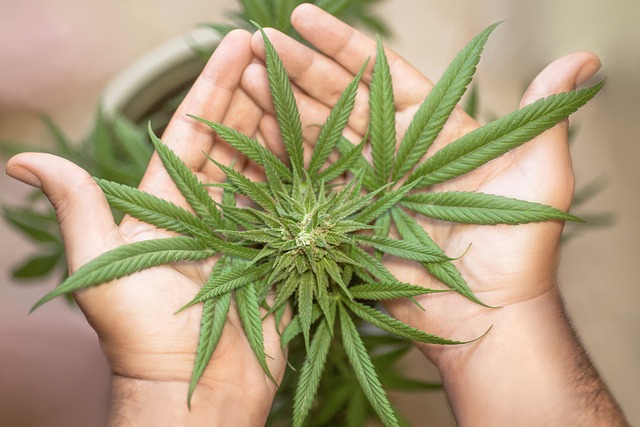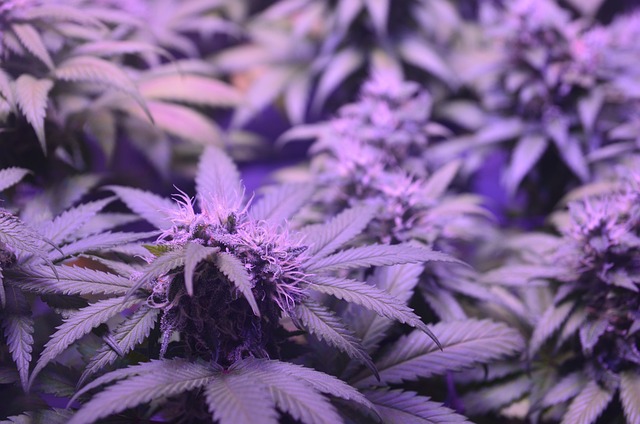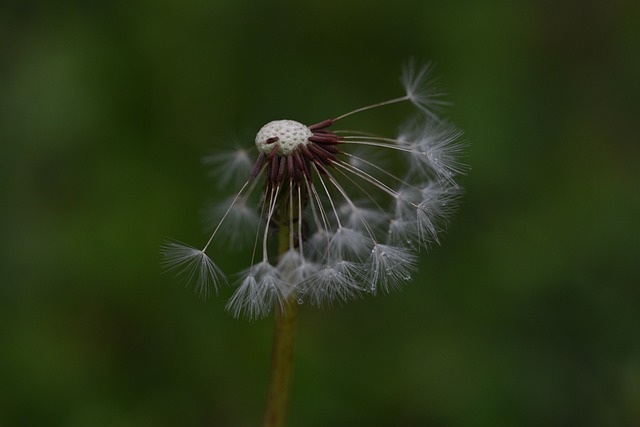The THCA flower is emerging as a key player in the cannabis science sector, offering therapeutic benefits distinct from its psychoactive counterpart, THC. Found naturally in raw cannabis plants, THCA acts as a non-intoxicating precursor and has been found to work synergistically with CBD and terpenes, collectively enhancing health effects through what is known as the 'entourage effect.' This interaction can provide relief from conditions like pain and inflammation without causing a psychoactive high. The potential of THCA in conjunction with CBD and terpenes represents a promising direction for cannabinoid-based therapies, offering a nuanced approach to wellness and health management by leveraging the combined effects of these compounds. The research underscores the importance of understanding how THCA interacts with the endocannabinoid system and highlights the benefits of the CBD synergy with terpenes, pointing towards a more effective treatment for various ailments using cannabis-derived products.
Explore the emerging landscape of THCA flower, a natural compound within the cannabis plant that’s gaining attention for its potential wellness benefits. This article delves into the science behind THCA flower, its unique role in the cannabinoid family, and how it synergizes with CBD and terpenes to offer a range of health advantages. From its potent properties when consumed in raw form to the intricate interplay of compounds that enhance the entourage effect, we’ll uncover the therapeutic potential of THCA flower and provide guidance on incorporating it into your daily wellness regimen. Join us as we navigate the legal considerations, cultivation best practices, and user experiences that underscore the benefits of this promising cannabinoid. With a focus on CBD synergy with terpenes, this comprehensive guide offers a balanced view of THCA flower’s role in holistic health and its future in research and applications.
- Unveiling THCA Flower and Its Role in Cannabis Science
- The Potency of Raw Cannabinoids: Understanding THCA
- THCA Flower vs. CBD: A Comparative Analysis of Benefits
- Terpene Profiles and Their Impact on the Entourage Effect
Unveiling THCA Flower and Its Role in Cannabis Science

The THCA, or tetrahydrocannabinolic acid, flower represents a pivotal element in the cannabis science landscape, offering unique benefits distinct from its decarboxylated counterpart, THC. THCA is the raw, non-psychoactive precursor to THC, found abundantly in raw cannabis plants. When heated, it degrades into THC, but it possesses a different profile of effects and interactions within the body’s endocannabinoid system. The THCA flower contains high concentrations of this acid, which, when consumed, can provide potential health benefits without the psychoactive ‘high’ associated with THC.
Research has begun to shed light on the synergistic effects of THCA in conjunction with other cannabinoids and terpenes found within the cannabis plant. This CBD synergy with terpenes, often referred to as the entourage effect, is a key area of interest for scientists and healthcare professionals alike. The entourage effect posits that when THCA interacts with CBD and various terpenes, their combined effects can be more potent and potentially offer broader therapeutic applications than any single compound alone. This holistic approach to cannabinoid therapy could lead to new avenues for managing pain, inflammation, and a host of other conditions without the mind-altering effects of traditional THC products. As such, the study of THCA flower benefits is an exciting frontier in cannabis science, with promising implications for wellness and health.
The Potency of Raw Cannabinoids: Understanding THCA

Delta-9 tetrahydrocannabinol (THC) is well-known for its psychoactive properties, but its raw precursor, tetrahydrocannabinolic acid A (THCA), offers a distinct set of benefits. THCA is the non-psychoactive predecessor of THC and is abundant in raw cannabis flowers. Research suggests that THCA interacts with the body’s endocannabinoid system, potentially offering therapeutic effects without the psychoactive influence associated with its decarboxylated counterpart. The potential health benefits of THCA include neuroprotective, anti-inflammatory, and analgesic properties.
When considering the entourage effect, the synergy between cannabinoids and terpenes found in the whole-plant extracts, including CBD, becomes particularly significant. This synergy enhances the overall efficacy of the plant’s compounds. THCA, alongside other cannabinoids like CBD, can elevate the therapeutic potential of hemp extracts. The interaction between THCA and terpenes within the flower can lead to a more effective and holistic approach to wellness, as these compounds work in harmony to provide a broader spectrum of effects compared to isolating individual cannabinoids. This CBD synergy with terpenes, including those present in THCA flowers, is crucial for those seeking a balanced and nuanced experience, harnessing the full potential of hemp’s medicinal profile.
THCA Flower vs. CBD: A Comparative Analysis of Benefits

The therapeutic properties of cannabinoids have garnered significant attention in recent years, with THCA flower and CBD emerging as key subjects of interest due to their distinct benefits and potential synergies with terpenes. THCA, or tetrahydrocannabinolic acid, is the raw form of THC found in raw cannabis plants. Unlike its psychoactive counterpart THC, THCA does not induce a high but has been reported to offer several wellness benefits. It may support joint and muscle health and exhibit anti-inflammatory properties, which can be particularly beneficial for those seeking relief without psychoactive effects. On the other hand, CBD, or cannabidiol, is non-psychoactive and has gained popularity for its wide range of applications in health and wellness. It interacts with the body’s endocannabinoid system, influencing various physiological processes and potentially offering relief from anxiety, pain, and other conditions.
The synergy between THCA flower and CBD can be amplified by the presence of terpenes, which are aromatic compounds found in cannabis and many other plants. Terpenes are known for their individual therapeutic qualities, such as anti-inflammatory, analgesic, and anti-anxiety effects. When combined with THCA and CBD, these terpenes can enhance the entourage effect, a phenomenon where the compounds work together to produce a more potent therapeutic impact than any single compound alone. For instance, limonene, a common terpene, may elevate the mood-boosting properties of CBD, while myrcene can potentially increase the painkilling effects of THCA. This synergy makes the THCA flower and CBD not just alternatives but complementary choices for individuals seeking the most beneficial outcomes from cannabis-derived products.
Terpene Profiles and Their Impact on the Entourage Effect

Cannabis flowers rich in THCA, or tetrahydrocannabinolic acid, exhibit a unique therapeutic potential that is amplified by their terpene profiles. These naturally occurring compounds within the cannabis plant are not only responsible for its distinct aromas and flavors but also play a crucial role in enhancing the effects of THCA through what is known as the entourage effect. The entourage effect refers to the synergistic interaction between THCA and the various terpenes present, which can modulate the pharmacological properties of each other. For instance, the terpene myrcene is known for its anti-inflammatory effects and can enhance the pain-relieving qualities of THCA. Similarly, limonene, with its uplifting and energizing properties, can potentiate the mood-elevating aspects of THCA flower benefits.
Furthermore, when considering CBD synergy with terpenes, the combination becomes even more profound. CBD, or cannabidiol, is another significant non-psychoactive compound found in hemp and cannabis plants. It has been widely studied for its potential health benefits, including anxiety relief and anti-inflammatory effects. When combined with THCA and the array of terpenes, this synergy can lead to a more potent and targeted therapeutic effect. For example, the terpene linalool is known for its calming and sedative properties, which complement CBD’s anxiolytic effects. This combined action can lead to a more effective treatment for various conditions without the psychoactive side effects typically associated with THC. As such, the interplay between THCA, CBD, and terpenes within cannabis flowers offers a promising avenue for holistic health and wellness, with each component contributing uniquely to the overall therapeutic profile of the product.
THCA flower emerges as a multifaceted component within the cannabis spectrum, offering distinct advantages that set it apart from its counterpart, CBD. The intricate interplay between THCA’s raw cannabinoids and the rich terpene profiles within these flowers amplifies the synergistic effects, promising a range of benefits for users. This article has illuminated the potential of THCA flower in harnessing the full spectrum of cannabis science, highlighting its potency, and delineating how it stands out when compared to CBD. The entourage effect, enhanced by the synergy between THCA and terpenes, underscores the unique position of THCA flower as a therapeutic agent. As research continues to evolve, the significance of this natural compound is poised to become increasingly recognized in various wellness regimens, offering a promising alternative for those seeking the benefits of CBD with the added potential of THCA.
